Table of Contents
Magento (now Adobe Commerce) is an open-source e-commerce platform written in PHP. The platform offers you tools to create and manage your online stores seamlessly.
With Adobe Commerce, you can access a flexible and scalable commerce platform. You can easily craft unique and tailored B2B and B2C experiences, whether you have many brands or not.
Mind you, an online store isn’t a marketplace; it represents a single brand or business. Unlike marketplaces where you’re charged a commission for selling a product or service, an online store allows you to make profits directly from selling products, without charges.
With that being said, is Magento’s online store worth the money and trouble?
Read on to find out for yourself.
- Let’s Cut to the Chase!
- Now, Let’s Detail Things for You.
- What’s the Catch With the Magento Online Store?
- What You Need to Know.
- What Are Magento Online Store Competitors Offering?
- What Affects Magento Online Store Prices?
- What Affects Prices in the Industry Overall?
- How to Get the Best Deal With Magento Online Store?
- Can You Afford Magento Online Store Prices?
- Finally: Should You Buy Magento Online Store or Not?
Let’s Cut to the Chase!
Buy It If:
- ✅ You seek native AI solutions: You can create AI-driven experiences that are tailored to your customers – whether you’re into B2B or B2C business models. With the platform’s AI-powered tool, you can deliver relevant content, boost your team’s productivity, and deliver personalized site searches.
- ✅ You run a B2B or B2C business model: Magento allows you to manage several brands, overseeing your B2B and B2C stores from a single platform. You can build multiple storefronts at scale while tailoring the shopper’s checkout experience with different payment services.
- ✅ You want extensive customization capabilities: Magento permits you to build custom apps and robust native capabilities using present-day development tools and API. You can also integrate or replace non-Magento services using Magento’s flexible API.
- ✅ You want scalability: You can grow your Magento online store with ease. As your customers grow and opportunities shift, the platform helps you to adapt to the changes. Expect features such as omnichannel personalization, tailored content, promotions, and site search via machine learning and AI.
- ✅ You are tech-savvy: You may find the platform appealing if you have some level of technical expertise. This is because most of its features require technical know-how, especially if you want to do some installation, customization, or maintenance.
- ✅ You’re seeking a platform with enhanced security measures: Magento has robust security features to keep your online store safe. It is also PCI-compliant. This means that if you run a business that involves online transactions and collecting sensitive customer data, you may find Magento appealing.
MORE >>> Wix eCommerce Platform Review
Don’t Buy If:
- ❌ You have zero IT skills or knowledge: You may find Magento a bit confusing or intimidating if you don’t have prior expertise in tech. This is because that platform has some features such as integration and customization that requires some level of tech knowledge. You may need to hire a third party to assist in that regard.
- ❌ You’re on a tight budget: While Magento doesn’t disclose its prices on its website, there are complaints from some customers on Trustpilot that Magento is incredibly expensive. If you’re seeking a low budget, you may consider alternative platforms to build your store.
- ❌ You run a simple business with fewer e-commerce needs: You may not need to waste your money if your business only requires basic e-commerce functionality. For instance, if you only need a few products, standard payment, and shipping options, you may need to look for a less complex platform to build your store.
THE BOTTOM LINE
🌐 Magento is a good choice if you’re seeking to build an online store. The platform offers a wide collection of tools and features to give you an “experience that makes all the difference.” Remember, though, that Magento is quite pricey, and requires some level of technical know-how to easily navigate yourself round the platform. But in all, the platform is a good option to consider.
Now, Let’s Detail Things for You.
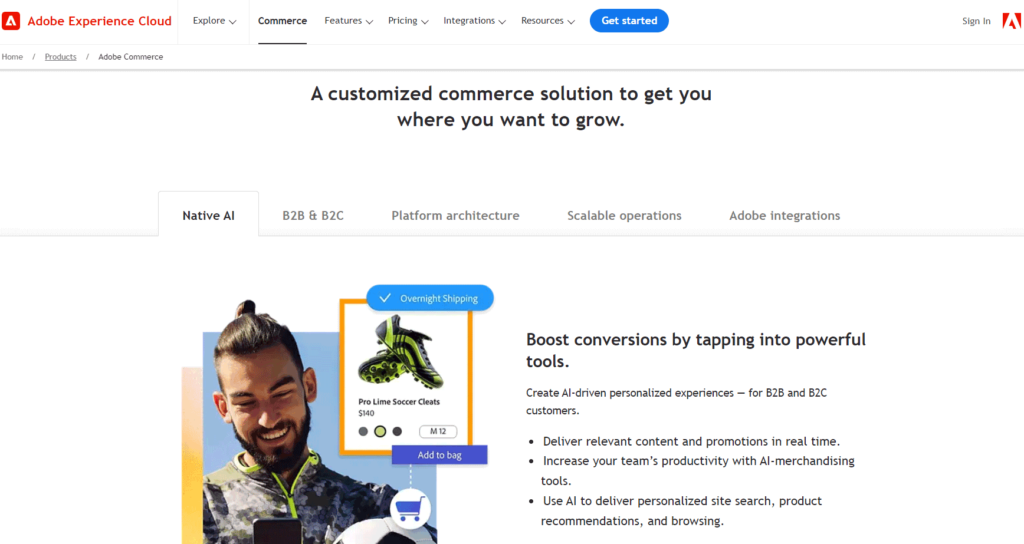
Magento provides three pricing tiers you can choose from. The first is the Magento Open Source which is free and offers limited features.
You have the Adobe Commerce Pro, containing all the features merchants of any size or business model can operate with. That means you may find the basic features you need within this plan.
On the other hand, you have the Managed Services. As the name suggests, this plan provides tailored solutions to help you decrease risks and minimize disruptions by leveraging bits of help from its experts.
When it comes to pricing, Magento’s pricing is based on yearly Gross Merchandise Value (GMV), and Average Order Value (AOV). This means that Magento takes into account the total value of merchandise sold through its platform in a year, and the average value of individual orders.
Be aware also that the platform doesn’t state its prices on its plans. By implication, you need to contact Magento’s representative to get a quote that’s tailored to your needs.
What’s the Catch With the Magento Online Store?
As earlier mentioned, Magento doesn’t disclose its prices on its website. While the platform indeed offers three pricing plans, you need to speak with a representative to get the actual quote for each plan.
Why is that so?
Well, no reason stated, except that such a model allows Magento to curate the features you may need, and tailor its prices accordingly.
A word of caution: be careful with companies that don’t disclose their prices. It may be a trap to charge you more as you buy their services.
Remember, customers have expressed dissatisfaction regarding Magento’s pricing. You can check out review sites such as Trustpilot, ConsumerAffairs, and Forbes to see different opinions to that regard.
Make sure you understand each plan and the feature set. Ask questions about anything you’re not clear about. Also, check out Magento’s competitors to see what they’re offering.
What You Need to Know
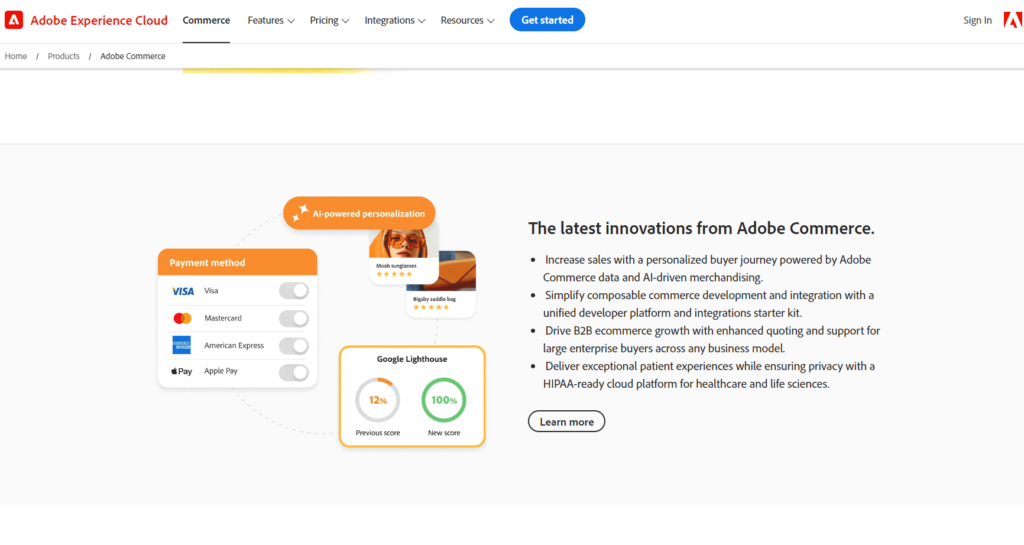
It is already established that Adobe Commerce (Magento) doesn’t disclose its prices for its plans. You must contact Magento’s sales representative to get your custom quotes.
Meanwhile, as you keep yourself informed on all the necessary information regarding Magento’s pricing, take note of the additional costs you may get while using the platform.
These costs may come on a pay-per-month or one-off basis.
For the monthly additional costs, you have the web hosting service that costs anywhere from $14 to $40 per month. Domain costs $10 to $20 per year. The SSL certificate’s prices can range from $50 to $600 per year. A web developer may charge you per hour depending on how professional he or she is. And the transaction fees can be anywhere between 2% to 4% for every sale.
However, be aware that there are one-off fees you may encounter. For instance, if you’re opting in for premium themes, you can set aside $17 to $399. And around $5,000 if you’re going for a highly customized theme.
Similarly, when you request extensions and add-ons, keep around $2,000. Mind you, prices may change with time. Ensure you visit Magento’s website to stay updated.
PRO TIPS >>> Best Ecommerce Platforms for Online Store
What Are Magento Online Store Competitors Offering?
Magento vs. Wix
Wix helps you build a website and online store, just like Magento. Wix offers you a collection of tools such as drag-and-drop editor, integrated hosting, and incredible design templates.
Keep in mind, also, that Wix isn’t an open-source platform like Magento. Rather, it is a proprietary, fully hosted website builder. This means that its source code is not available for modification or distribution.
Unlike Magento, Wix provides details about its prices. The platform allows you to choose from any of its pricing plans. The Light plan costs $17/mo, the Core plan costs $29/mo and the Business plan takes $36/mo. Remember, you can also ask for a custom quote supposing any of its plans do not meet your requirements.
Magento vs. WooCommerce
Both WooCommerce and Magento are similar in that they’re open-source e-commerce plugins for building websites or online stores. The platform is well-known for its extensive plugin ecosystem, customization capabilities, good SEO functionality, and large community support.
While WooCommerce is a free open-source software, there are costs you must bear to launch an online store. On average, WooCommerce hosting costs $120 per year, while the domain registration fee is $15. Set aside some funds for themes, shipping, payment gateways, and other add-ons that may be necessary to your store building.
Magento vs. PrestaShop
Think of PrestaShop as another Magento in a different organization. PrestaShop and Magento are both open-source e-commerce platforms. It has a wide collection of features to help you build a responsive online store while maximizing the benefits it comes with.
Remember, the cost you incur to set up an online store depends on how big your business is and the requirements it has. Don’t forget that building an online store comes with extra charges, outside the subscription plan.
At PrestaShop, you can expect to pay $10 to $15 annually for a domain name, while SSL can cost from $5 to $1,000 yearly, depending on your needs and requirements. You can visit PrestaShop’s website or speak with its sales representatives to learn more about its pricing and plans.
Magento vs. Squarespace
Squarespace offers you website-building functionalities alongside integrated e-commerce capabilities. Squarespace, unlike Magento, is a fully hosted website builder–just like Wix.
To allow you to have a taste of its offerings, Squarespace offers you a 14-day free trial. You have two billing methods–monthly and yearly.
Squarespace offers you four different price tiers each, distinctively curated to accommodate diverse kind of needs. Its price begins with the Person plan, costing $16/mo, while the Business plan takes $23/mo.
The Commerce (basic) plan charges $28/mo, while the Commerce (advanced) plan is priced at $52/mo. Remember, you’re getting a percentage discount on all plans provided you choose the annual billing method.
What Affects Magento Online Store Prices?
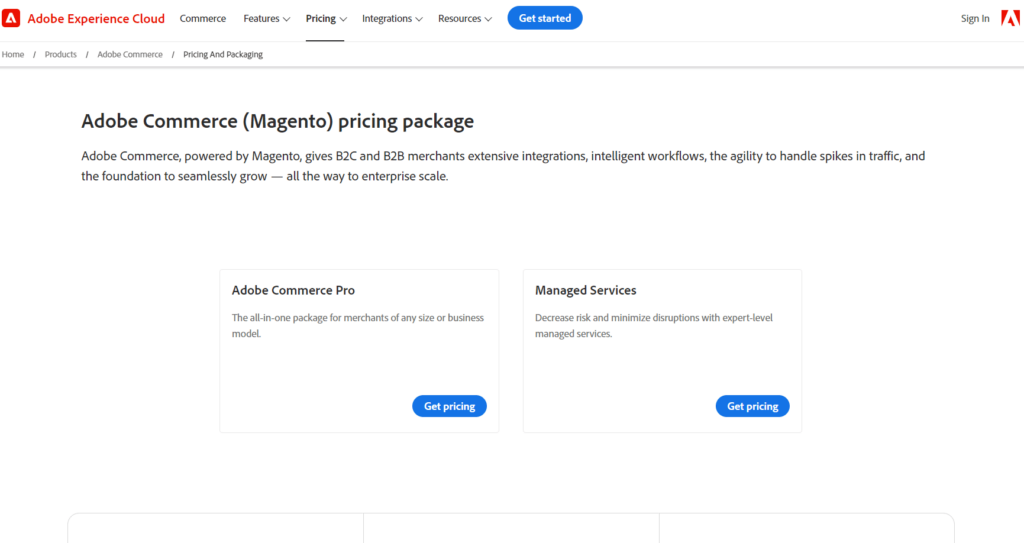
Be aware that a lot of factors can influence the cost of creating an online store on the Magento platform. By understanding these factors, you can carefully plan and manage your resources, while having better control over your budget. Here’s a peek into price dynamics in the Magento platform.
The Subscription Plan
Just like most providers, Magento allows you access to its services through plan tiers. Each plan contains a set of well-curated features and functionality that addresses a specific business size and needs. Typically, the more features you need, the more money you pay. And so, prices can be impacted based on the subscription plan you choose.
Method of Billing
Generally, subscription-based services accept their payments using different billing methods. Normally, billing methods include monthly, yearly, and biannually. The shorter your billing period is, the higher your fees. If you opt-in for a longer payment term, you can expect discounts on any payment you make.
Hosting
The cost of hosting your online store on Magento’s platform can impact the overall price you pay. Mind you, costs differ with each plan as earlier pointed out. Services you’re paying for include server specifications and performance requirements. If you’re going for a Magento-managed hosting, the cost can range from $50 to $500+ for each month.
Discounts and Promotions
Occasionally, Magento, just like most online store management platforms, offers discounts and promotions to attract both new and old users. Understand that these incentives have impacts on the overall cost of purchasing a plan. Keep an open eye to leverage these benefits when they come.
Customization
Indeed, your business needs may not be exactly like someone else’s. Recognizing this possibility, Magento makes provision for custom quotes. So, if what you’re seeking isn’t completely found in any of its plans, you can speak with a representative to provide a tailored solution to your needs. But, mind you, customization comes with additional costs.
Integrations
Integrations can significantly impact the overall cost you pay for using Magento’s online store solution. If for instance, you want to integrate with third-party platforms such as ERP systems, payment gateways, and CRM platforms, you can expect to pay additional fees to access those services.
What Affects Prices in the Industry Overall?
Beyond company-specific factors that influences prices, there are general reasons why prices in the online store creation vary. When you understand how these factors work, you can have better grounds to plan your budget and manage the costs that accompanies launching and managing an online store. Here’s how prices work in the industry overall.
Choice of Platform
Understand that there are several platforms in the industry offering website and store-building services. Some come at cheaper prices while others come at expensive prices. If you choose to go for lesser-known providers, you may likely get lower prices compared to the big players in the industry.
Legal Compliance
There are basic legal requirements and services you need to keep your site safe and active. You may encounter additional costs when you request premium legal services such as GDPR compliance, and accessibility (ADA) compliance. Your cost of purchase also increases when you go for additional consultation.
Choice of Hosting
There are typically two kinds of hosting services you can get in the industry. They include hosted, and self-hosted platforms. If you’re going for hosted platforms such as Shopify, or BigCommerce, be prepared for subscription-based pricing. Whereas, the self-hosted services such as Magento, or WooCommerce allow you to host your website or store on a separate hosting platform.
Shipping and Fulfillment
Creating and running an online store needs shipping and fulfillment services. When you include shipping and fulfillment options in your plan, that can increase the overall cost. Oftentimes, the basic setup is cheaper when compared to the advanced solution.
Features and Customization
The number of features and customization a service provider offers impacts the cost of purchase. For instance, if you’re going for pre-made themes, you may get them at affordable price and sometimes free. They’re also quick to implement. On the other hand, custom themes cost more because they’re tailored to specific brand requirements.
Extensions and Plugins
Extensions and plugins are essential tools you need to have a fully functional, well-positioned online store. For basic plugins such as SEO tools, social media integrations, and analytics, you may get them at cheaper rates–sometimes, free. However, if you’re going for the premium functionalities such as advanced marketing tools, CRM integrations, and the like, the cost can add up.
GET SMARTER >>> Shopify vs Magento
How to Get the Best Deal With Magento Online Store?
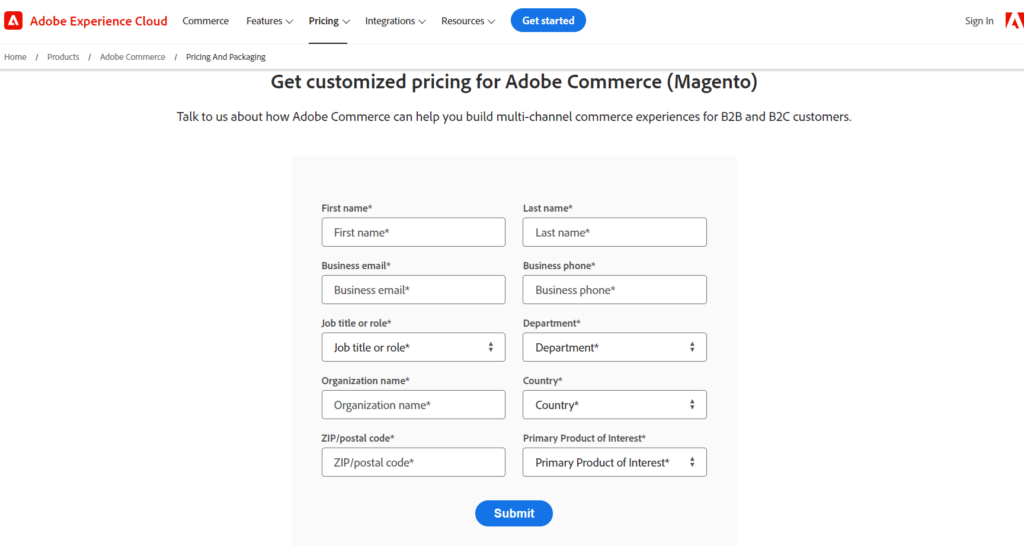
Getting the best deal with the Magento online store calls for careful consideration of certain factors. These factors–when properly implemented–give you an edge to maximize the value you get while managing your costs effectively.
1. Prepare, plan, and plan
Before contacting Magento for an online store creation solution, ensure you understand exactly what you need. Know what your business goals and requirements are. Also, understand how long you intend to stay in the business. Sit down, get a pen and a book, and plan your actions. Review your plans, and make sure the vision is clear. This helps you in preparing your budget.
2. Prepare a Budget
Your budget is like a compass that guides you along the path of purposeful spending. A budget helps you to stay on course while spending within your means and plans. Again, sit down, and write a list of things you need to purchase to build an online store. Evaluate the total cost of owning a store on the Magento platform. This includes initial and ongoing costs.
3. Keep an Eye on Discounts and Promos
Occasionally, Magento runs promos and discounts for both old and new customers. Sign up for Magento’s newsletter and follow its social media platform to stay informed on the latest happenings. This way, you can know when incentives are on so you can leverage them.
4. Negotiate Deals
Don’t be shy to negotiate with Magento especially when you’re purchasing multiple extensions or services. You can talk with the company for bulk discounts. You can also sieve the services you’re choosing. Remove features you don’t need and ask for a price cut for the subtracted items.
5. Choose the Annual Contracts
Normally, companies–including Magento–offer different billing methods when it comes to pricing. You have the ‘per month’ billing, annual billing, and the biannual payment methods. Understand that the longer billing methods often come with discounts.
6. Hire Experienced Developers
If you do not know about online store creation on Magento, it is recommended that you get experienced hands to help you out. You can get experienced developers from Magento or simply check out agencies who are skilled in delivering efficient, high-quality work.
Can You Afford Magento Online Store Prices?
Your ability to afford Magento online store prices depends on some key factors. You don’t have to rob a bank if you understand these factors. That way, you can make the most from Magento.
So, how do you go about the whole thing?
First, clearly define your business needs and requirements. If you clearly understand what your business needs are, it becomes easy to craft a budget.
Second, craft your budget and know how much is it going to cost you (from A-Z) to build a Magento online store. This helps you stay accountable to yourself and to maintain business ethics.
Third, define your long-term goals. Where do you see your business in the next 5 years? What are your projected monthly profits? Do you have plans to expand your niche? These and many more questions can be relevant in determining your long-term goals.
Remember, Magento doesn’t clearly state its prices on the platform. Be ready to negotiate with the company concerning your needs.
Go back and draw your plans and consider the above three factors when planning your purchases.
Finally: Should You Buy Magento Online Store or Not?
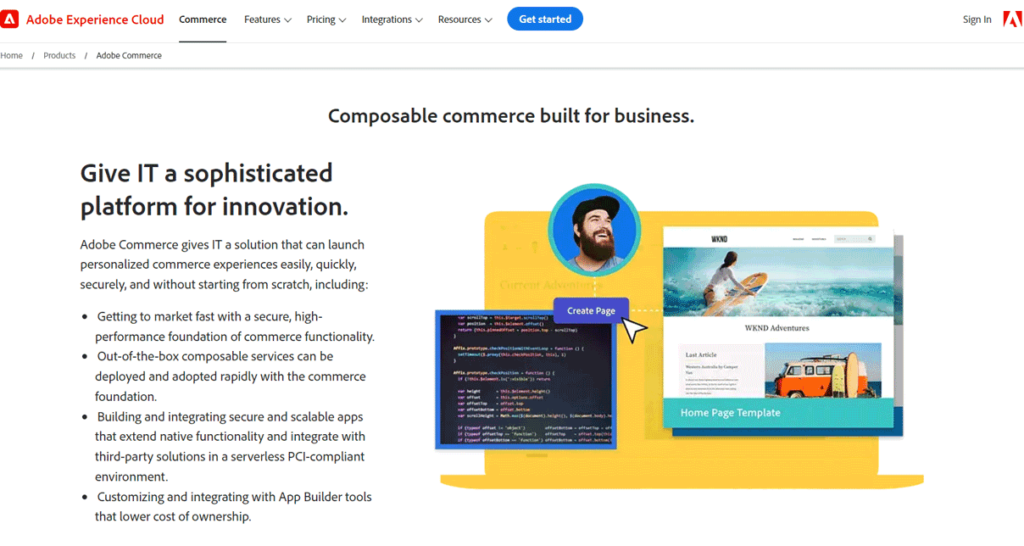
Magento is a good option when it comes to building an online store. The platform offers you all the necessary tools you need build your store and market products online.
Generally, the platform performs about average, judging from different review sites. For instance, on TrustRadius, Magento has positive remarks from users, while Trustpilot rates the platform with 3.5 stars out of 5 stars.
Similarly, G2 rates Magento 4.0 stars, while on Capterra, Magento has a 4.4-star rating.
You can see from the above submission that different review sites think Magento is a good platform to build your store.
So, back to the question again: Should you buy Magento online store or not?
The answer to this question is YES.
Buy it if you need a place to build an online store with available tools.








